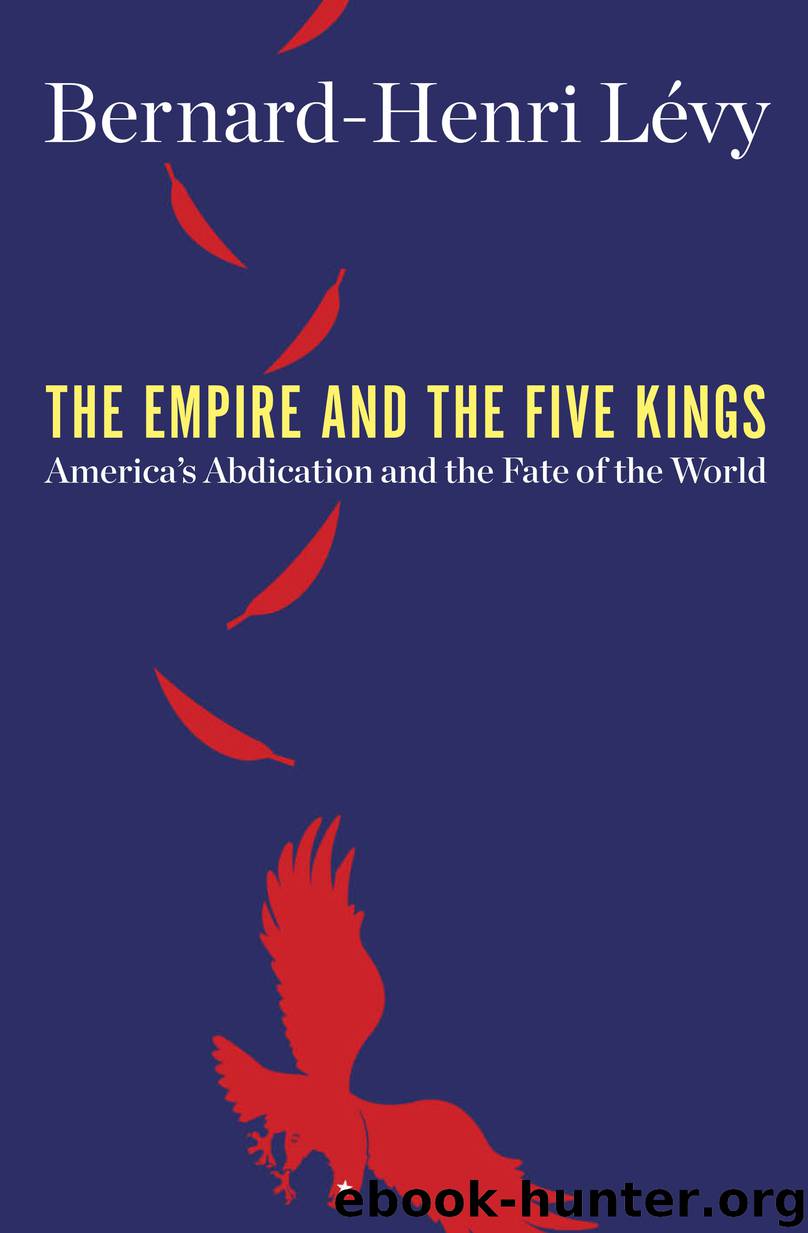The Empire and the Five Kings by Bernard-Henri Lévy

Author:Bernard-Henri Lévy
Language: eng
Format: epub
Publisher: Henry Holt and Co.
These five awakening countries, pleasantly surprised that history seems ready to repeat itself, these five kings, standing simultaneously on the balcony and in the street during this Kurdish version of the Battle of Jena, marvel as they see themselves mounting the horse of an emperor who seems to each of them to look just like him. These five kings have three traits in common.
* * *
They are, first, the heirs to some of the oldest empires the world has known.
Not all of the enemies of the democracies are former empires.
North Korea, which seems to pose a fearsome threat not only to the West but to the world as a whole, has never been an empire.
Nor has Pakistan, which I visited often at the time of my investigation into the death of Daniel Pearl and which remains, to this day, the same nuclear-armed gangster state.
Nor has Venezuela, a state that is a calamity for Venezuelans and a friend of the most shunned regimes (Pakistan, of course, along with North Korea, Iran, Russia, and others just as odious), while also being the architect of the farcical “Bolivarian alliance.”
And among the former empires, among all of the peoples who, hostile or not, have yielded at one time or another to the imperial impulse that Nietzsche (in Twilight of the Idols) said can be the crowning glory of politics when it aspires to be great and to avoid the shopkeeper’s spirit, there are degrees of difference.
Some have been tiny: the Phoenician empire consisted of trading posts; Sweden’s and Denmark’s were limited to nearby conquests.
Others were vast but brief: at the beginning of the thirteenth century, Genghis Khan’s empire of the steppes was larger than those of Alexander, Charlemagne, and Rome; but it was also more ephemeral, lasting barely a century before being swallowed by the Persians and the Turks that it had supposedly vanquished.
Others, such as the European colonial empires, were too criminal to become the stuff of legend: objects of dispute, yes; of nostalgia for some and revulsion for many more; but nothing capable of sustaining a national religion.
These five, by contrast, the five that were active in and around the Kurdish theater, the five forces on the move—the Turks, Iranians, Russians, Chinese, and the Sunni caliphs—the five powers bent on revising the international order and preparing to show their hand (each at its own pace) in challenge to the United States and Europe, have the distinctive characteristic of being custodians of the most legendary examples of empire and of being, right up to the present, passionately inhabited by this imperial memory.
I remember attending a conference at the Second Foreign Languages Institute in Beijing in 1986, during my very first trip to China. I discovered that it was forbidden to mention the early dissidents and awkward to mention Mao and those who surrounded him in his later years. But the Cultural Revolution had not erased the memories of the Hans, Mings, and Qings, nor of any of the Sons of Heaven and empire
Download
This site does not store any files on its server. We only index and link to content provided by other sites. Please contact the content providers to delete copyright contents if any and email us, we'll remove relevant links or contents immediately.
| Arms Control | Diplomacy |
| Security | Trades & Tariffs |
| Treaties | African |
| Asian | Australian & Oceanian |
| Canadian | Caribbean & Latin American |
| European | Middle Eastern |
| Russian & Former Soviet Union |
The Secret History by Donna Tartt(16623)
The Social Justice Warrior Handbook by Lisa De Pasquale(11489)
Thirteen Reasons Why by Jay Asher(7788)
This Is How You Lose Her by Junot Diaz(5771)
Weapons of Math Destruction by Cathy O'Neil(5036)
Zero to One by Peter Thiel(4824)
The Myth of the Strong Leader by Archie Brown(4789)
Promise Me, Dad by Joe Biden(4447)
Beartown by Fredrik Backman(4417)
Stone's Rules by Roger Stone(4415)
How Democracies Die by Steven Levitsky & Daniel Ziblatt(4398)
The Fire Next Time by James Baldwin(4342)
100 Deadly Skills by Clint Emerson(4077)
A Higher Loyalty: Truth, Lies, and Leadership by James Comey(4032)
Rise and Kill First by Ronen Bergman(4012)
The David Icke Guide to the Global Conspiracy (and how to end it) by David Icke(3881)
The Farm by Tom Rob Smith(3872)
Secrecy World by Jake Bernstein(3782)
The Doomsday Machine by Daniel Ellsberg(3731)
